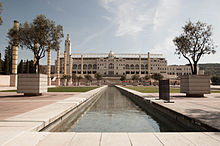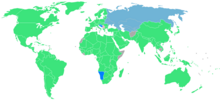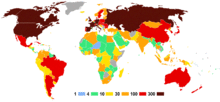
A | B | C | D | E | F | G | H | CH | I | J | K | L | M | N | O | P | Q | R | S | T | U | V | W | X | Y | Z | 0 | 1 | 2 | 3 | 4 | 5 | 6 | 7 | 8 | 9
 Emblem of the 1992 Summer Olympics | |
| Host city | Barcelona, Spain |
|---|---|
| Motto | Friends for Life (Spanish: Amigos para siempre, Catalan: Amics per sempre) |
| Nations | 169 |
| Athletes | 9,386 (6,663 men, 2,723 women) |
| Events | 257 in 25 sports (34 disciplines) |
| Opening | 25 July 1992 |
| Closing | 9 August 1992 |
| Opened by | |
| Cauldron | |
| Stadium | Estadi Olímpic de Montjuïc |
Summer Winter
1992 Summer Paralympics | |
| Part of a series on |
| 1992 Summer Olympics |
|---|
|
The 1992 Summer Olympics (Spanish: Juegos Olímpicos de Verano de 1992, Catalan: Jocs Olímpics d'estiu de 1992), officially known as the Games of the XXV Olympiad (Spanish: Juegos de la XXV Olimpiada, Catalan: Jocs de la XXV Olimpíada) and commonly known as Barcelona '92, was an international multi-sport event held from 25 July to 9 August 1992 in Barcelona, Catalonia, Spain. Beginning in 1994, the International Olympic Committee decided to hold the Summer and Winter Olympics in alternating even-numbered years. The 1992 Summer and Winter Olympics were the last games to be staged in the same year.[2] These games were the second and last two consecutive Olympic games to be held in Western Europe after the 1992 Winter Olympics in Albertville, France, held five months earlier.
The 1992 Summer Games were the first since the end of the Cold War, and the first unaffected by boycotts since the 1972 Summer Games.[3] 1992 was also the first year South Africa was re-invited to the Olympic Games by the International Olympic Committee, after a 32-year ban from participating in international sport due to Apartheid.[4] The Unified Team (made up by the former Soviet republics without the Baltic states) topped the medal table, winning 45 gold and 112 overall medals.
Host city selection
Barcelona is the second-largest city in Spain and the capital of the autonomous community of Catalonia, and the hometown of then-IOC president Juan Antonio Samaranch and the famous European club, FC Barcelona. The city was also a host for the 1982 FIFA World Cup. On 17 October 1986, Barcelona was selected to host the 1992 Summer Olympics over Amsterdam, Netherlands; Belgrade, Yugoslavia; Birmingham, United Kingdom; Brisbane, Australia; and Paris, France, during the 91st IOC Session in Lausanne, Switzerland.[5] New Delhi, India, had announced a bid for the games, but withdrew in March 1986.[6] With 85 out of 89 members of the IOC voting by secret ballot, Barcelona won a majority of 47 votes. Samaranch abstained from voting. In the same IOC meeting, Albertville, France, won the right to host the 1992 Winter Games. Paris and Brisbane would eventually be selected to host the 2024 and 2032 Summer Olympics respectively.[7]
Barcelona had previously bid for the 1936 Summer Olympics that were ultimately held in Berlin.
| City | NOC Name | Round 1 | Round 2 | Round 3 |
|---|---|---|---|---|
| Barcelona | 29 | 37 | 47 | |
| Paris | 19 | 20 | 23 | |
| Belgrade | 13 | 11 | 5 | |
| Brisbane | 11 | 9 | 10 | |
| Birmingham | 8 | 8 | — | |
| Amsterdam | 5 | — | — |
Highlights


- At the innovative opening ceremony, Greek mezzo-soprano Agnes Baltsa sang "Romiossini" as the Olympic flag was paraded around the stadium. Alfredo Kraus later sang the Olympic Hymn in Catalan, Spanish and French, as the flag was hoisted.
- The Olympic cauldron was ignited using a flaming arrow, lit from the flame of the Olympic torch. It was shot by Paralympic archer Antonio Rebollo, who aimed the arrow over the top of the cauldron to ignite the gas emanating from it. The arrow landed outside the stadium.[9] This unusual method for lighting the cauldron had been carefully designed to avoid any chance of the arrow landing in the stadium if Rebollo missed his target.[10][11]
- South Africa rejoined the Summer Olympics having been banned for its apartheid policy after the 1960 Summer Olympics. The women's 10,000 metres event was hotly contested. White South African runner Elana Meyer and black Ethiopian runner Derartu Tulu (winner) ran hand-in-hand in a victory lap.[12]
- Germany sent a unified team having reunified in 1990, the last such team was at the 1964 Summer Olympics.
- As the Soviet Union was dissolved in 1991, the formerly Soviet-occupied states of Estonia and Latvia sent their own teams for the first time since 1936, while Lithuania sent its own team for the first time since 1928. The other former Soviet republics decided to compete together and formed the Unified Team, which consisted of present-day Armenia, Azerbaijan, Belarus, Georgia, Kazakhstan, Kyrgyzstan, Moldova, Russia, Tajikistan, Turkmenistan, Ukraine, and Uzbekistan. The Unified Team finished first in the medal standings, edging the United States.
- The separation of the Socialist Federal Republic of Yugoslavia led to the Olympic debuts of Croatia, Slovenia and Bosnia and Herzegovina. Due to United Nations sanctions, athletes from the Federal Republic of Yugoslavia (consisting of present-day Serbia and Montenegro were not allowed to participate with their own team. However, some individual athletes competed under the Olympic flag as Independent Olympic Participants. Serbia would return to the Olympics at the 2008 Summer Olympics and as well as Montenegro on would be its Olympic debut as separate states.
- In basketball, the admittance of NBA players led to the formation of the "Dream Team" of the United States, featuring Michael Jordan, Magic Johnson, Larry Bird and other NBA stars. Prior to 1992, only European and South American professionals were allowed to compete, while the Americans used college players. The Dream Team won the gold medal and was inducted as a unit into the Basketball Hall of Fame in 2010.[13]
- Fermín Cacho won the 1,500 m in his home country, earning Spain's first-ever Olympic gold medal in a running event.[14]
- Chinese diver Fu Mingxia, age 13, became one of the youngest Olympic gold medalists of all time.
- In men's artistic gymnastics, Vitaly Scherbo from Belarus, (representing the Unified Team), won six gold medals, including four in a single day. Scherbo tied Eric Heiden's record for individual gold medals at a single Olympics, winning five medals in an individual event (Michael Phelps would later equal this record in 2008).
- In women's artistic gymnastics, Tatiana Gutsu took gold in the All-Around competition edging the USA's Shannon Miller.
- Russian swimmers (competing for the Unified Team) dominated the men's freestyle events, with Alexander Popov and Yevgeny Sadovyi each winning two events. Sadovyi also won in the relays.
- Evelyn Ashford won her fourth Olympic gold medal in the 4×100-metre relay, making her one of only four female athletes to have achieved this in history.
- The young Krisztina Egerszegi of Hungary won three individual swimming gold medals.
- In women's 200 m breaststroke, Kyoko Iwasaki of Japan won a gold medal at the age of 14 years and six days, making her the youngest-ever gold medalist in swimming competitions at the Olympics.
- Algerian athlete Hassiba Boulmerka, who was frequently criticized by Muslim groups in Algeria who thought she showed too much of her body when racing, received death threats[15] and was forced to move to Europe to train, won the 1,500 metres, also holding the African women's record in this distance.
- After being demonstrated in six previous Summer Olympic Games, baseball officially became an Olympic sport. Badminton and women's judo also became part of the Olympic program, while slalom canoeing returned to the Games after a 20-year absence.
- Roller hockey, Basque pelota, and taekwondo were all demonstrated at the 1992 Summer Olympics.
- Several of the USA men's volleyball gold medal team from the 1988 Olympics returned to vie for another medal. In the preliminary round, they lost a controversial match to Japan, sparking them to shave their heads in protest. This notably included player Steve Timmons, sacrificing his trademark red flattop for the protest. The U.S. team ultimately progressed to the playoffs and won bronze.
- Mike Stulce of the United States won the men's shot put, beating the heavily favored Werner Günthör of Switzerland.
- On the 20th anniversary of the Munich massacre and the 500th anniversary of the Alhambra Decree, Yael Arad became the first Israeli to win an Olympic medal, winning a silver medal in judo. The next day, Oren Smadja became Israel's first male medalist, winning a bronze in the same sport.
- Derek Redmond of Great Britain tore a hamstring during a 400-meter semi-final heat. As he struggled to finish the race, his father entered the track without credentials and helped him complete the race, to a standing ovation from the crowd.
- Gail Devers came into the 100 meters hurdles as the favorite. Though her Olympic history shows her winning the 100 meters dash twice, the first time earlier in this Olympics, she primarily made her career as a hurdler. And true to form, Devers had a commanding lead in this race until the final hurdle. Devers came up short and hit the hurdle, foot first, hard, knocking her off balance. She stumbled toward the finish line, falling on the last step, but still finished fifth, .001 out of fourth place. Paraskevi Patoulidou of Greece won the gold medal to even her own disbelief, dropping to her knees on the track when she realized she had won.
- Jennifer Capriati won the singles tennis competition at the age of 16. She had previously earned a spot in the semifinals of two grand slams at the age of 14.
- Two gold medals were awarded in solo synchronized swimming after a judge inadvertently entered the score of "8.7" instead of the intended "9.7" in the computerized scoring system for one of Sylvie Fréchette's figures. This error ultimately placed Fréchette second, leaving Kristen Babb-Sprague for the gold medal. Following an appeal, FINA awarded Fréchette a gold medal, replacing her silver medal and leaving the two swimmers both with gold.[16]
- Indonesia won its first ever gold medal after winning a silver at 1988 Olympics. Susi Susanti won the gold in badminton women's singles after defeating Bang Soo-hyun in the final round. Alan Budikusuma won the badminton men's singles competition, earning a second gold medal for Indonesia. Several years later, both players married and they received the nickname golden couple and Olympic couple.
Records
Venues





- Montjuïc Area:
- Cross-country course – modern pentathlon (running)
- Estadi Olímpic de Montjuïc – opening/closing ceremonies, athletics
- Palau Sant Jordi – gymnastics (artistics), volleyball (final), and handball (final)
- Piscines Bernat Picornell – modern pentathlon (swimming), swimming, synchronized swimming, and water polo (final)
- Piscina Municipal de Montjuïc – diving and water polo
- Institut National d'Educació Física de Catalunya – wrestling
- Mataró – athletics (marathon start)
- Palau dels Esports de Barcelona – gymnastics (rhythmic) and volleyball
- Palau de la Metal·lúrgia – fencing, modern pentathlon (fencing)
- Pavelló de l'Espanya Industrial – weightlifting
- Walking course – athletics (walks)
- Diagonal Area:
- Camp Nou – football (final)
- Palau Blaugrana – judo, roller hockey (demonstration final), and taekwondo (demonstration)
- Estadi de Sarrià – football
- Real Club de Polo de Barcelona – equestrian (dressage, jumping, eventing final), modern pentathlon (riding)
- Vall d'Hebron Area:
- Archery Field – archery
- Pavelló de la Vall d'Hebron – Basque pelota (demonstration) and volleyball
- Tennis de la Vall d'Hebron – tennis
- Velodrome – cycling (track)
- Parc de Mar Area
- Estació del Nord Sports Hall – table tennis
- Olympic Harbour – sailing
- Pavelló de la Mar Bella – badminton
- Subsites
- A-17 highway – cycling (road team time trial)
- Banyoles Lake – rowing
- Camp Municipal de Beisbol de Viladecans – baseball
- Canal Olímpic de Catalunya – canoeing (sprint)
- Circuit de Catalunya – cycling (road team time trial start/ finish)
- Club Hípic El Montayá – equestrian (dressage, eventing endurance)
- Estadi de la Nova Creu Alta – football
- Estadi Olímpic de Terrassa – field hockey
- Estadio Luís Casanova – football
- La Romareda – football
- L'Hospitalet de Llobregat Baseball Stadium – baseball (final)
- Mollet del Vallès Shooting Range – modern pentathlon (shooting), shooting
- Palau D'Esports de Granollers – handball
- Parc Olímpic del Segre – canoeing (slalom)
- Pavelló Club Joventut Badalona – boxing
- Pavelló de l'Ateneu de Sant Sadurní – roller hockey (demonstration)
- Pavelló del Club Patí Vic – roller hockey (demonstration)
- Pavelló d'Esports de Reus – roller hockey (demonstration)
- Pavelló Olímpic de Badalona – basketball
- Sant Sadurní Cycling Circuit – cycling (individual road race)
- Some events, including diving, took place in view of construction of the Sagrada Família
Medals awarded
The 1992 Summer Olympic programme featured 257 events in the following 25 sports:
| 1992 Summer Olympics Sports Programme | ||||
|---|---|---|---|---|
|
Demonstration sports
 Basque pelota (10)
Basque pelota (10) Roller hockey (quad) (1)
Roller hockey (quad) (1) Taekwondo (16)
Taekwondo (16)
Participating National Olympic Committees


A total of 169 nations sent athletes to compete in the 1992 Summer Games.
With the dissolution of the Soviet Union, twelve of the fifteen new states chose to form a Unified Team, while the Baltic States of Estonia and Latvia sent their own teams for the first time since 1936, and Lithuania sent its own team for the first time since 1928. Bosnia-Herzegovina competed for the first time as an independent nation after its separation from Socialist Yugoslavia, and Namibia and the unified team of Yemen (previously North and South Yemen) also made their Olympic debuts. Croatia and Slovenia made their first Summer Olympic appearance at these games having participated in the 1992 Winter Olympics in Albertville.
The 1992 Summer Olympics notably marked Germany competing as a unified team for the first time since 1964 and the first time as a single nation following German reunification since 1936. South Africa returned to the Games for the first time in 32 years.
The Federal Republic of Yugoslavia was banned due to UN sanctions, but individual Yugoslav athletes were allowed to take part as Independent Olympic Participants. Four then-existing National Olympic Committees did not send any athletes to compete: Afghanistan, Brunei, Liberia and Somalia.
Number of athletes by National Olympic Committee
| IOC | Country | Athletes |
|---|---|---|
| USA | 545 | |
| ESP | 489 | |
| GER | 485 | |
| EUN | 475 |
Calendar
- All times are in Central European Summer Time (UTC+2)
| OC | Opening ceremony | ● | Event competitions | 1 | Gold medal events | CC | Closing ceremony |
